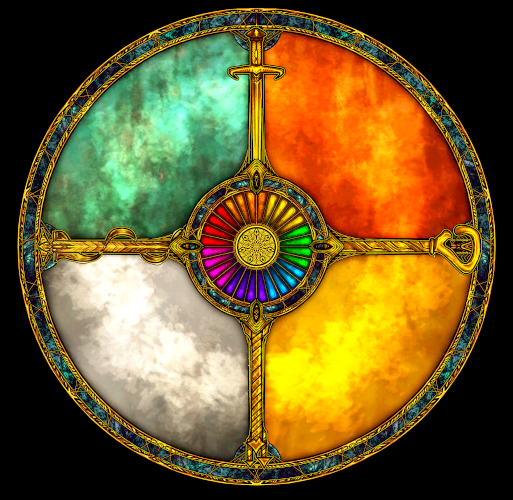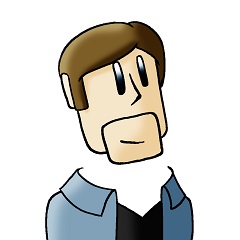Runak-Hantut
The thumping of the drums was audible kilometers away, long before the arena of Kaman-Ut was even visible. Buredal felt as if the growing rhythm of the noise was slowly pushing on his whole body like a heartbeat that was not his own. A very fast heartbeat, produced by hundreds, thousands of Orcs. As he approached with Larnesh, the orcen guide who had shown him the lands of Corékor these past weeks, watching the shouting, brawling, drinking Orcs dressed in bloody red or venomous green, firing up colored flames and magical explosions, he muttered half under his breath "This is about as barbaric as I always imagined Orcs."
Either Maned's blessing was not upon him or Kamanthet, daughter of Larnesh, had incredible hearing. She leaned down to him "You call this barbaric? Little dwarf, what do you know? Yes, we are celebrating wild and we drink and dance and hit the drums as hard as we can.
We simply enjoy these games instead of going to war over small things. For the past two thousand years, there as never been an armed conflict between Orcs. Every time we quarrel, this game will decide who gets the spoils. You dwarves, the arrogant elves, and the unloyal humans, constantly fight and kill each other over land, over metal, over principle. We settle every matter with a competition and the strongest, most resourceful or most clever clan wins. Nobody dies.
How in Lirini's name do you call this barbaric?"
The Traditional Runak-Hantut
Make games, not warA great Shaman, Runak Koronesh saw the decline of the Orcs during the war of the races, mostly because of conflict between themselves. When the two biggest clans at that time were arguing about who would lead their armies against the enemies and it seemed inevitable they would turn on each other, Runak, a powerful shaman, stepped in and spoke with both leaders and both their clan's shamans.
He proposed to settle the matter with a game, where every Orc clan can show how powerful and cunning they are. Who would deserve to claim the right to lead the armies, without decimating those armies. The leaders both understood that Runak was right, but neither wanted to back down, showing weakness.
It was then, that Lirini herself appeared to both clans, declaring her favor for Runak and his idea. The first ever Runak-Hantut (The "Decision of Ranuk") was held and the winning clan's leader Kaman agreed that this game was indeed worthy to show the prowess of a clan. He vowed to always uphold Lirini's will and never again raise his weapon in anger against a fellow orc - except in the arena.
To this day, the most important matters for Orcs are decided in a competition at the first arena, Kaman-Ut, where the winner over three rounds with the most points also gets to claim the right in whatever matter was argued over.
First round - Kruund'urs
This was not a game, this was total chaos! Buredal felt unable to grasp the rules of this game, while he watched each team of fifteen Orcs each run at each other, shout each other and hit each other with shocking force. Some were wearing weapons, but not all of them. Some were running towards the other side of the arena, fighting every step of the way, but not all of them. The crowd cheered and yelled, especially when opposing team members were clashing against each other. How could this be anything other than a battle?
Buredal sighed. He wanted to make an account of the orcen lands, he should better pay closer attention. Each player was wearing clothing in their team colors and they wore different bandanas. The ones with the white bandana seem to be lagging behind, keeping more to their starting area. Orcs with a black bandana were those rushing forward, striking at the area of the enemy team.
Buredal had no idea what the remaining players were supposed to do. There were five of them per team, each with a colorful bandana and a ribbon around their waste. He squinted and made out a golden disk around this ribbon - just as the player he was watching got ambushed by two enemy players and knocked down. The red crowd's cheers almost blasted his ears away and the successful player raised the golden disk up in triumph.
The red team managed to score another one of the disks and brought them back into their home arena. The scoreboard above the stands now showed two red circles, just as the timepiece in the center of it turned to zero. The cheering branded up once more, the fighting in the arena stopped
The Players
The fifteen players consist of five scouts and ten competitors that are either fighter or defender. Between rounds, fighters and defenders can switch positions, as long as there is at least one fighter and one defender left (if possible).
Second Round - Kruund'orth
They were attacking! Buredal recognized it early on, as the green mass of spectators started to shout louder and louder. The green team advanced in full formation to the front and cornered part of the red team near their homebase. Amazing, how much these brutes combine their strength with surprisingly good tactics, as they carefully singled out the strongest of their enemies.
But their attack is costly and the tide of the battle swings against them - a fact that the red geared spectators all aounrd him celebrate with loud drumming and chanting fitting to the magical explosions that now accompany the battle. More and moreOrcs of red and green colors go to the floor, apparently unconsious. The numbers on the scoreboard get changed constantly, to reflect the current state of the game.
Suddenly another magical explosion lights up the arena, blinding green light and the roar of celebration from the other side is deafening. In the arena the fighters retreat or tend to the unconcious.
"What happened? The round is already over, so soon?" With a smile on his face, Larnesh turned to him "The other team destroyed the red artifact. They realized they were losing too many people and decided to end this round this way. It does not matter, their team is almost decimated and we caught many Gurnath!" Buredal's look went to the scoreboard and truly to his secret dismay, the red team were clearly leading in points.
Points
Because there are only three rounds, at most three artifacts can be destroyed throughout the whole game
These points are noted the moment it happened but are only fixed once the round is ended and the player is still unconscious. If he rallies or gets help from a fellow player, the points are lost.
Knocked out players are out of the game the next round. If all players of a team are knocked out this ends the game prematurely.
If however a scout is able to recapture any Gurnath, those points are no longer awarded at the end of the game. The scout has to hold on to and carry all Gurnaths he recaptures.
If all five Gurnath of a team are captured, this will end the game prematurely.
Third Round - Kruund'inesh
Buredal now sat the edge of his seat. The third round started with two very decimated teams - but green clearly in the disadvantage. Still, their last fighter and scout quickly dispersed in the arena, hidden behind many obstacles, while their three defenders staed to defend their homebase.
And here the attack came! The red team went fully offensive, only leaving on defender behind. The green defenders fight with everything they have, even managed to capture a third Gurnath from a scout, but the attackers edged closer and closer to the artifact. The shouts and chants around Buredal grew painfully intense.
His look darted towards the red homebase. Here as well a fight was in progress, almost unnoticed by most. The green fighter and scout were overwhelming the defender, but both defender and fighter went down. The scout was alone at the home base and the artifacts started shimmering red when he got close to them.
But his goal weren't the artifacts, no, he darted past them, grabbing the golden disks, lying on the floor beside them with noone to guard them. Buredal looked at the score board - the red team just lost forty points, being behind the green team by eleven points.
At this very moment, the green artifact got destroyed.
The game was over.
And with a sudden shock the red team had to realize that they lost.
The resulting decision
Moments after the magical light from the artifact declared the end of the game, chaos broke loose on the stands. The Orcs on the green side shouted, yelled and started running onto the fields, embracing their cunning winners. Slowly, a chant started and Buredal could hardly make out the worlds "Kara-Nuk" growing louder and louder. The mood was enticing, Buredal still felt the rush of excitement of the last minutes of this incredible game.
Larnesh and Kamanthet were quiet, stone faced, their red shawls drooping limply from their shoulders. "It is a shame your team lost, but it is just a game! Your team will win next time!" Buredal had to shout because more and more orcs joined the shouts of "Kara-Nuk!", the chanting growing to a storm of celebration.
When Larnesh turned to him, a look of sorrow, Buredal never associated with any Orc, showed on his face. "Yes. This here was just a game. But every game decides about a major matter for us Orcs - and every Orc has to accept the outcome."
Trying to blend out the growing shouts of "Kara-Nuk" by literally thousands of Orcs now, he asked. "But what was the matter? Did you argue about some rich iron mines?"
"My little dwarven friend, this was far more important then your treasures of the earth. The Orcs of Corékor will no longer sit idly by, watching how in the north the so called Holy Domain of Keandra opresses the orcen clans in the eastern mountains.
Do you know what 'Kara-Nuk' means?
It means 'total war'.
This is no longer a game."







Excellent ending, I want to know what happens next!
As do I! :-) The current conflict between the Orcs and Keandra is a topic I had in mind for a while now, and this article or the prose part of it is really playing on the very current events.